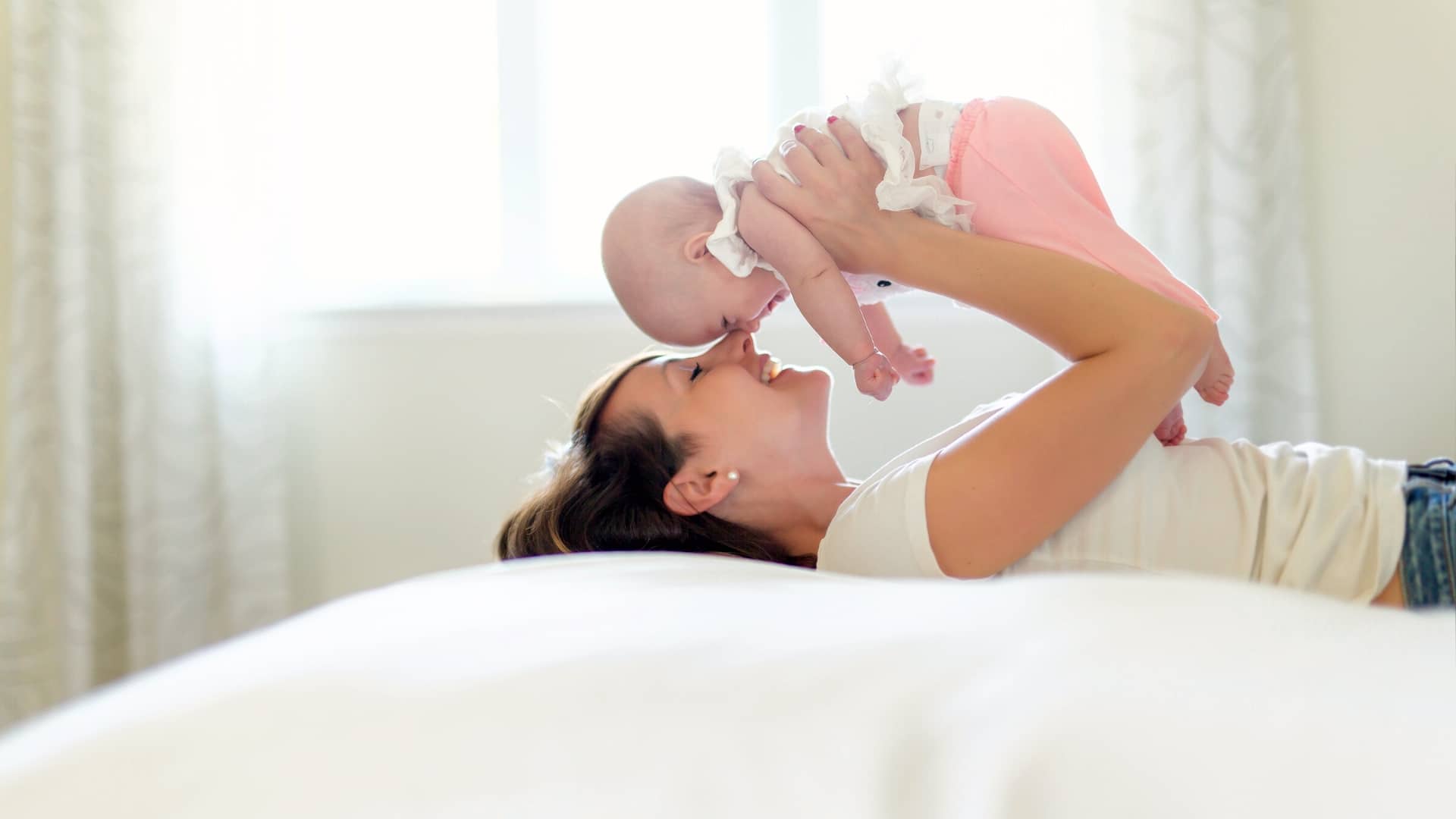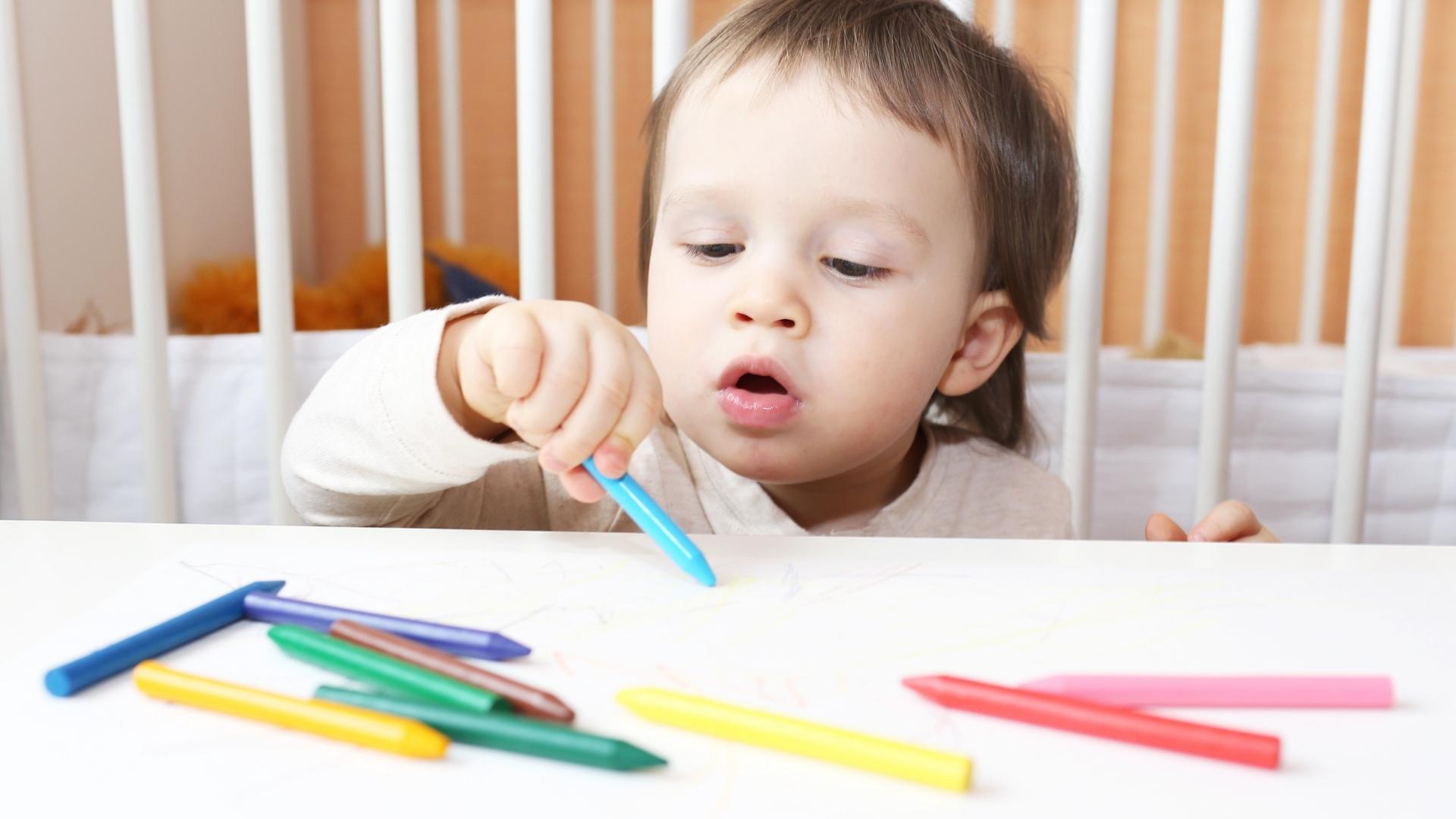Have you ever thought to yourself “Do I have to entertain my baby all the time they’re awake?” By breaking down exactly when to entertain your baby and when it’s OK to leave your baby alone, I will be giving you the knowledge to raise a happy baby who’s content to play alone which gives you precious (anxiety-free) time to yourself to be a better parent.
Do I Have To Entertain My Baby All The Time?
The simple answer to “Do I have to entertain my baby all the time?” is… no. Babies require a balance of both alone time and interactive play with you to develop to their full potential.
Benefits Of Independent Or Solo Play
So when I am asked “do I have to entertain my baby all the time?” and I say no… I remind parents that there are many important benefits of solo play. So, here are the most important ones:
- It allows your baby to explore the world at their own pace
- Solo play teaches your little one how to focus and concentrate
- They can learn from their mistakes
- Improves problem-solving skills
- It can help with separation anxiety
- Independent play teaches a sense of self and self-confidence
- Motor skills and attention spans are improved
- It also helps to improve imagination and creativity
The American Academy of Pediatrics states that “Play facilitates the progression from dependence to independence and from parental regulation to self-regulation.”
So it goes without saying that play is hugely important and offering your baby a range of age-appropriate play activities is essential to their overall development whether that be while they are playing socially or on their own.
Looking to get your little one to sleep quickly and effortlessly? Check out my Bedtime and Nap Cheat Sheet and master the art of making daytime naps and bedtimes as seamless as possible.
A bedtime & nap cheat sheet so good your little one will ask you to put them to bed...
Laura Williams "This is a life saver! I'm so glad I downloaded your bedtime & nap cheat sheet. My little one actually asked me to put him to bed last night! Unbelievable! Thank you so much!"
Click Here For The FREE Cheat Sheet
4 Types Of Independent Play Activities For Babies
Independent play typically comes with the idea that your baby should be doing a coordinated activity by themselves… But the truth is…
There is a whole variety of activities that contribute to independent play.
1. Busy Doing Nothing
Contrary to popular belief, a newborn baby doesn’t need to be ‘doing something’ in order to be learning from independent play.
Remember that the world is all new to them. They are seeing everything for the very first time and discovering what their bodies can do.
So, whilst they may look like they are just staring into space… their brains are still working hard!
When they see their hand for the first time they are not even aware that it belongs to them and they will find it fascinating. When they do realise that they have control over their hands then they spend hours discovering what their hands can actually do.
It is so important that we must allow our children to just be.
Creativity is born out of letting the mind wander and these early days will allow your baby to explore the world at their own pace. Lying under a play gym is a wonderful way to start.
This play gym is designed by experts for baby's developing brain and body. Winner of multiple awards it includes everything you need in an activity gym-from batting to teething to learning to focus-for a whole year of play.
2. Utilise Play Pens
While it is not good to leave your little one for extended periods of time in a playpen… there are occasions when they are ideal for keeping your little one safe for short amounts of time.
If you are needing to do something where it is not appropriate or safe for your baby to be with you… then letting them have the opportunity to play in a playpen alone will help you and will lead to all sorts of beneficial developmental progress.
You can start by watching your baby play and talk about what they are doing. Don’t interfere unless absolutely necessary.
Once your baby has become used to spending time in the playpen with you close by, you can start to leave the room for short periods.
Remember, keep popping back to offer encouragement and check that they are doing OK. Continue to do this until they are used to being left to play alone and play independently.
Perfect for families with a young baby, this pack n play comes with a removable bassinet and diaper changing station as well as a spacious and airy playard for your little one to play in as they grow! Designed with style, longevity and baby safety in mind, Graco has created the perfect playroom companion for busy parents.
For more information about play pens and how to use them responsibly, check out this post.
3. Child-Directed Play
When you sit on the sidelines and let your baby lead the play then you are allowing them to experience child-directed play.
You can offer encouragement and talk about what they are doing. You can praise them when they succeed and help when needed… But remember, you are not leading the activity.
On these occasions, it is OK for you to be engaged in something else such as folding the laundry, reading a book, or working on your computer as long as you are in the vicinity and paying attention when necessary.
Some ideas of child-directed play include:
- Drawing and painting
- Playing musical instruments
- Playing with playdough
- Reading a book
- Playing with open-ended toys
- Having a teddy bear tea party
- Tummy time and learning to crawl (with you observing nearby)
4. Outdoor Independent Play
When your baby is small, having plenty of time in the fresh air is wonderful. You can put them outside in their pram or on a blanket and let them look up at the sky and the trees.
Of course, monitor the weather and keep checking in with your baby to ensure they’re happy and content.
As they become more mobile you can move the playpen outside too as watching nature will be a great learning experience for them.
Once your baby can walk, allow your baby to try new physical tasks such as climbing, jumping or kicking a ball without too much interference. It is OK for them to struggle for a bit.
Follow their lead and let them explore with you making sure they are safe on the sidelines.
How Long Can A Baby Play Alone For?
All children will need your company every now and then, but here’s a rough guideline of how long your little one can be left to play independently:
- 6 months old – 5 minutes
- 12 months old – 15 minutes
- 18 months old– 15-20 minutes
- 2 years old – 30 minutes
REMEMBER: “Infancy is a time of great dependence. Nevertheless, babies should be allowed to do things for themselves from the very beginning.” – Magda Gerber
When Can I Start Leaving Baby Alone?
Before your baby is old enough to hold a rattle or reach out at a hanging toy from a play gym, you can leave your baby to watch a mobile over their crib, or the leaves on a low-lying branch while lying in their pram outside for brief periods of time.
This award-winning crib mobile from the trusted Manhattan Toys range is perfect for entertaining your newborns without being overwhelming. It has 10 interchangeable cards that offer a range of simple high-contrast images to more complex coloured patterns and graphics to boost your little one's visual development!
Practice makes perfect when teaching baby to be content by themselves, so allow your baby to get used to spending short periods of time alone in their crib or Moses basket when they are relaxed with a full tummy and open to playing alone.
It is perfectly natural that you may feel you need to be with your new baby all the time. However, life will get in the way sometimes and you will need to put your baby down to do things at some point.
If your baby is used to being alone, then you are less likely to have those anxious situations where you have to put them down in their crib for a few minutes and they cry with despair at your leaving.
These are all the beginnings of learning to self-settle. Check out this video to learn more:
Frequently Asked Questions About Do I Have To Entertain Baby All The Time
Here are a few frequently asked questions that often come up when parents ask me “Do I need to entertain my baby all the time?”
What Happens If I Don’t Interact With My Baby?
If you do not interact with your baby at all, they will not develop to their full potential and this distance can cause emotional issues in the future.
Babies need to feel loved and safe in order to thrive. So talking to your baby, playing with them and showing them the world are needed for your baby to feel cherished. This is also how you and your baby will form a very special bond.
So, the bulk of your time should be spent interacting with your baby but balanced with short periods of time where you encourage them to play and explore independently.
How Do I Ensure Baby Is OK Being Left Alone?
Babies are very fussy. They do not like abrupt changes so going from being held to being alone calls for good timing from you…
As I briefly mentioned before, make sure your little one has a full tummy and has been winded. Change their nappy and keep talking to them as you place them in their crib or on a blanket.
Don’t walk away immediately.
Stay and talk for a while, turn on the mobile and encourage them to look at it.
Once they seem settled, walk away saying you will be back soon. If they cry, then gently return, talk to them and try again.
Gradually, your baby will get used to these short periods of solo play and they will trust you to return. But remember to never leave them for more than is age-appropriate.
TOP TIP: Don’t dash to pick up your baby as soon as they wake. Allowing your baby to play alone for a while before you go to them is an ideal time for your baby to benefit from and practice independent play.
How Do I Entertain A Clingy Child?
At around 8 months of age, your baby will become acutely aware that they are separate from you and may develop separation anxiety. This is perfectly normal but may derail your attempts to get them to play alone.
A good way to approach solo play with a clingy child is to make the most of opportunities that can be turned into moments of independent play.
For example, if they crawl off to look at a toy across the room just watch and observe what they do. Don’t interrupt or join in. As long as they are safe, allow them to independently play.
Again, if they are safe you could leave the room for a minute. Don’t sneak out, tell them you are going and will be back in a minute. If they fuss, then offer verbal reassurance from the other room instead of dashing back.
These are tiny steps on the way to solo play… but what you are trying to do is establish trust. Your little one needs to know that you will not leave without telling them and that you will return when you say you will.
How Do I Entertain My Baby All Day?
As I mentioned above, there are numerous ways for you to entertain your baby throughout the day.
Usually, it’s a mixture of playing with toys or looking at books together and showing them the world around them and introducing them to other people.
REMEMBER: Your baby will love to hear the sound of your voice and watch what you are doing. So, point out things to them and show them interesting objects, sing songs, show them books, go for walks and generally introduce them to the world.
Is It OK To Leave My Baby To Play Alone?
Yes, it is definitely OK to leave your baby to play alone but only for an age-appropriate length of time and only when they feel safe and are happy to do so.
An overtired, hungry or wet diapered baby will not want to be left to play alone.
The point of teaching your baby to be alone in the early stages is to encourage and develop solo play as they grow. However, the bulk of time in your baby’s life when they are awake should be spent with you.
Need More Parenting Help?
- Download our FREE Bedtime & Nap Sleep Cheat Sheet. It’s a free, easy-to-use and proven formula designed for parents of 0-5 year olds to master the art of consistently undisturbed and restful sleep without the yelling, nagging or exhausting long-winded evenings.
- Check out our Parenting Toolbox. You’ll get access to expertly-chosen products that you can guarantee are the best for your little one and your wallet.
- Are you looking for personalized guidance to navigate the challenges of parenting? I offer 1-on-1 consultations to bring you tailored strategies and actionable advice to help support your child's growth and well-being with confidence.

A bedtime & nap cheat sheet so good your little one will ask you to put them to bed...
Laura Williams "This is a life saver! I'm so glad I downloaded your bedtime & nap cheat sheet. My little one actually asked me to put him to bed last night! Unbelievable! Thank you so much!"
Click Here For The FREE Cheat Sheet





